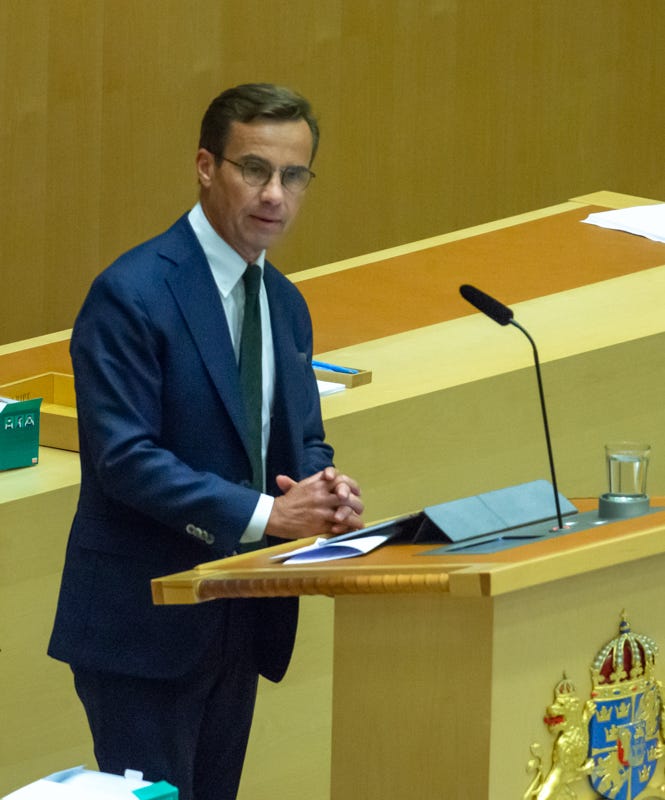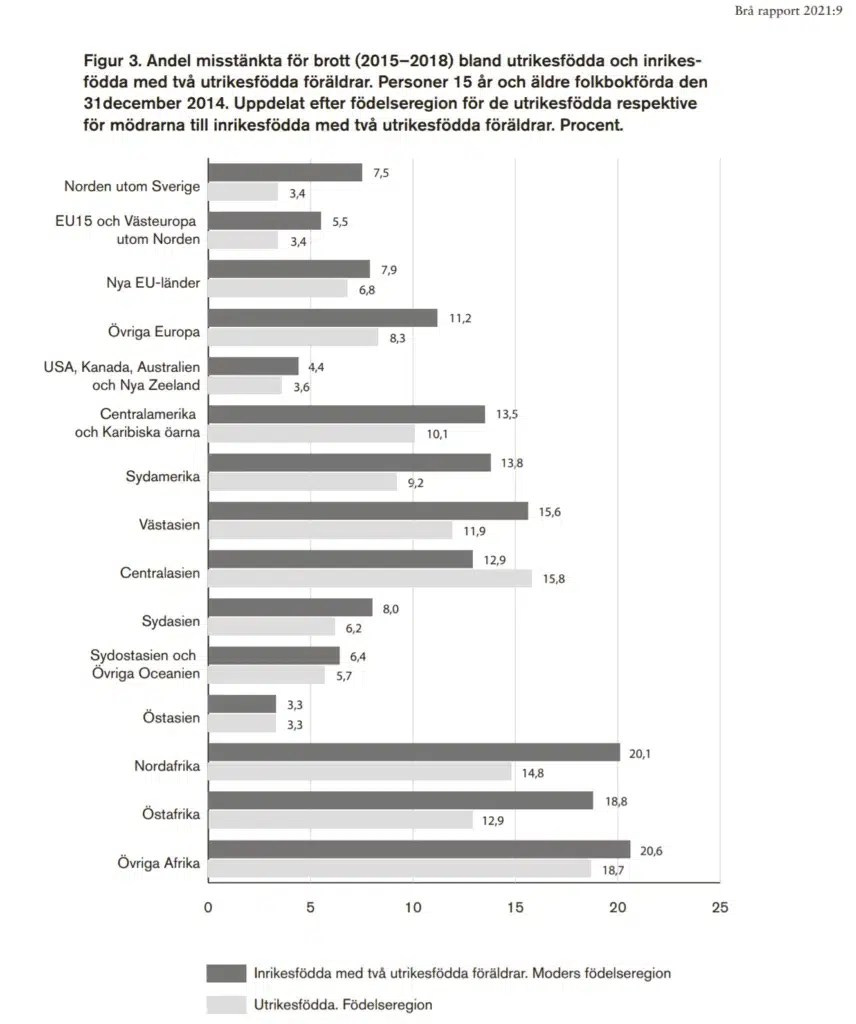Analysis: IMPACT OF IMMIGRATION - when fact-checking goes silent, part 2
The US, the UK and many other countries are struggling with the hordes of migrants. It is worth looking at the consequences of immigration in Sweden, which serves as a cautionary tale.
Key messages:
The problems associated with mass migration have been denied by many authorities and fact-checkers for years, but real life is increasingly highlighting the validity of these claims.
The labelling of mis- and disinformation is nowadays carried out by so-called fact-checkers, who primarily perpetuate the power narrative and do not assess objectively.
In Western countries, restrictions on freedom of expression are unfortunately deepening and authoritarian power tactics are being adopted.
Sweden is a prime example of the real consequences of immigration, which have finally led the country's last two prime ministers to condemn decades of 'open borders' migration policies.
As was pointed out in the first part of the analysis, free speech is one of the first victims when a society is plunged into crisis or when a lasting crisis is created. The Western world has gone from one crisis to another in this century, so it is no wonder that the situation with freedom of expression is becoming increasingly cloudy. Whenever the authorities start to curb free speech, a sweet-sounding justification is always found - be it the fight against 'disinformation' or the defence of 'minorities'.
Fact-checkers reinforce the power narrative
In a modern democracy, the government's own dissemination of misinformation or disinformation can in theory only be limited by the voter once every four years. And that could be the case only if the majority of voters have realised that they have been fed half-lies or lies by the authorities. But how can the voter comprehend this if, by restricting free speech and free expression, the amount of information reaching the public is also reduced? In several areas, however, even independent experts are powerless to counter the flood of information and propaganda from both state and corporate authorities.
Much of the labelling to misinformation and disinformation is based on the work of so-called fact-checkers.
The number of fact-checkers has grown from 11 organisations in the last 15 years to 424 by 2022.
This explosion in the number of fact-checkers shows that such organisations have been systematically set up in different countries, and are generously funded. Investigative journalist Paul D. Thacker pointed to the bias of fact-checkers in the summer of 2022, highlighting some of the worst fact-checkers, and how they help to spread rather than stop misinformation. Examples included the Covid-crisis, freedom of speech, academic freedom and also the suppression of a crucial issue of 2020 US presidential election in mainstream media - the laptop saga of candidate Joe Biden's son, or the corrupt influence peddling of the Biden family towards Ukraine and China.
One of the main functions of fact-checkers seems to be to refute inappropriate opinions and facts in the more problematic areas for the ruling powers, and to label them "false", "incorrect", "misleading".
Although climate alarmist Al Gore believes that man-made climate change will result in over a billion climate migrants within a century, such claims should be treated with scepticism, to say the least. History has shown that migrants are on the move in both hot and cold weather, and that by far the more important causes than climate change are the wars, authoritarian regimes and the 'open borders' policies of Western countries, which have driven large numbers of people out of Africa and the Middle East. And this has changed the face of many societies in Europe.
Sweden's 'open borders' policy
Criticism of migration and immigration has been a particularly tabooed subject and an object of stigmatisation in the EU and in many European countries for years. The link between immigrants from other continents and traditions and the accompanying negative phenomena, in particular crime and anti-social behaviour, has been strongly denied by politicians and social scientists, particularly with a Marxist background or influence. Those who make such links have been labelled as hate-mongers and disseminators of misinformation. According to Marxist ideology, nationalities have no place in 'modern' civilisation and the existence of independent nation states is one of the main obstacles to the emergence of a new order based on collective submission and standardisation.
The link between migration and crime has been disputed and downplayed, but the real problems cannot be hidden for long. Sweden exemplifies the impact of a steady flow of migrants on the security, safety and culture of society.
Sweden had very few immigrants in the beginning of the 20th century when the population was approximately 5,1 million inhabitants, of whom just 0,7-1% were foreign-born. It has been claimed that Sweden was the first European country where the idea of the so-called multiculturalism emerged into the political mainstream in the latter half of the 1960s and became public policy in the mid-1970s. On this basis, the ruling Swedish socialists introduced a new immigration policy that explicitly rejected the previous policy of assimilation and ethno-cultural homogeneity in favour of state-sponsored multiculturalism. This policy was implemented over several decades and opened the borders to hundreds of thousands of migrants.
Over the last two decades, the number of migrants in Sweden has doubled, reaching already one fifth of the population, or 2 million people. In 2015, Sweden received around 163,000 migrants, 145,000 in 2017 and 116,000 in 2019.
In the last 12 years, Sweden, with a population of 10 million, has received 1.2 million people, of whom more than 700,000 have also acquired Swedish citizenship.
In 2016, the Swedish state spent nearly €6 billion (5% of the national budget) on refugees alone.
Migrants and crime
Swedish society has seen a steady increase in crime and a decrease in the sense of security of its citizens this century. According to the National Council for Crime Prevention, Sweden has seen one of the highest levels of gun violence in Europe over the last 20 years - higher than in Italy or most Eastern European countries. Criminal gangs, whose members are second-generation immigrants, many of them from Somalia, Eritrea, Morocco and elsewhere in North Africa, specialise in drug trafficking and the use of explosives.
In 2022, Sweden reached a record 62 gun homicides, one of the highest per capita rates in Europe - nearly thirty times higher than in London.
In November 2023, Swedes ranked crime and violence (67%) as their biggest problem, by far outstripping inflation (28%), which ranked second.
Sweden has also seen attempts to hide criminal statistics on immigrants, including the ethnic origin and background of the perpetrators. It was not until 2021 that the authorities published criminal statistics (for 2015-2018) showing a criminality rate amongst the people of African background that is several times higher than that of natives or people of other European background. Another important conclusion can be drawn from the statistics when compared to the previous report from 2005 - integration of migrants has not been efficient, as inside a generation, the criminality of the highest risk groups has not decreased, but rather increased somewhat.
All of this has brought the tragic reality of migration to the attention of the political nomenclature long in denial or belittling the problem – not least because the pain of migration in the society has finally begun to have a tangible impact on the voters' decisions, and the anti-migration Sweden Democrats have reached their highest level of support.
Condemnation of Sweden's immigration policy
In autumn 2023, Ulf Kristersson, the leader of the Moderates party, was essentially the first Swedish prime minister to acknowledge the direct link between migration and the steady rise in crime. He blamed decades of "irresponsible immigration policies and failed integration" for the increased violence and criminal war terrorising Swedish society. Such an assessment by the head of the Swedish government five years earlier would have been unthinkable, as back then it would have been deemed politically incorrect to accept such conclusions.
According to prime minister Ulf Kristersson, the wave of violence that is ripping through their society is unprecedented, and no other European country has a situation like Sweden.
The seriousness of the situation is also illustrated by the Swedish government's decision to allow military to assist the police in the fight against criminal groups.

Moreover, in the spring of 2022, a few months before the parliamentary elections, the Swedish socialists, who had been in power for 28 years in the last four decades (including the last eight years), had to admit that their migration policy had failed because of a criminal crisis that was already visible to everyone. The then Prime Minister Magdalena Andersson bitterly acknowledged that the failure to integrate large numbers of immigrants admitted to the country over the past decades had led to parallel societies and gang violence. Indiscriminate migration policies meant, for example, that during the European migration crisis in 2015, Sweden received more migrants per capita than any other EU country.
According to Swedish government officials today, at least two thirds of migrants arriving in Europe do not actually have a valid reason to seek asylum.
Thus real life has largely disproved the myth propagated by many governments that the mass arrival of migrants has little impact on the security and well-being of a society. Similarly, even in the most concentrated crisis of recent years (Covid-19), most of the information and attitudes disseminated by the authorities have proved to be wrong and unscientific.
Continues with part 3 “Analysis: COVID-19 - untouched disinformation or when fact-checking goes silent”








